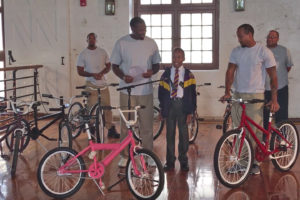I am so thankful to be exactly where I am


Even after 29 years as a teacher, it’s the little things that can cause you to stop dead in your tracks and reflect deeply about why you’ve chosen this profession. I experienced this recently in my classroom in rural Wisconsin. A few days ago, the only thing on our agenda was an old-school, six-page written test. It was the big-ticket item that was set to dominate our hour together. There was nothing remarkable about this assessment. It contained zero bells and whistles. To be honest, what was on the docket that day was not only a grind for them but for me as well (I am not good at keeping quiet for an hour). However, as I placed a test on the first table, the student quietly said, “Thank you.”
I moved to the second table. “Thank you,” uttered the next student. By the time I passed out the last test, 75% of my students had spontaneously thanked me for gifting them a six-page test. Amazing! But why? Why on earth did they thank me? As I paused to reflect on this strange occurrence, I realized it wasn’t strange at all. Thank yous abound every time I pass out papers. In fact, this happens with such regularity that I believe if I were to peer sternly at a student while handing them a one-way pass to the principal’s office, chances are I would hear, “Thank you.” Now that’s Midwest nice!
There are many things to love about teaching in a rural district. Hearing students say “thank you” regularly and often is one of them. Other favorites include: passing Future Farmers of America members bouncing merrily down the road on their John Deere on Drive-Your-Tractor-to-School Day, seeing community members line up outside our greenhouse for the spring flower sale, spotting local home-on-winter-break college students playing with the pep band at basketball games, and watching area hunters drop off their deer harvest for the Meat Tech class to process. Most heartwarming is welcoming our alumni back home to fill teaching and coaching vacancies. It is this sense of community that I am thankful for.
My own children rode the school bus and had plenty of stories to share over the years. Some were good-some, not so much.
One of their stories that sticks with me is about a quiet boy among their community of bus riders named Mark. Mark avoided the crazy bus antics, like the incident of the hand sanitizer being lit on fire in a back seat, by keeping his nose in a book. He was one of the first kids to be picked up on the route and the last to be dropped off. He spent that entire ride reading. He read challenging books of significant thickness. I was excited to meet him in person when he arrived at the high school. Then I learned the “why” behind his voracious appetite for reading.
Mark was diagnosed with a degenerative eye disease that eventually would take his sight. In his own words, “I’m reading now, because some day I won’t be able to.” As he progressed through high school, Mark needed additional supports. Towards the end of his senior year, I would hear him tapping his white cane along the hallway during his training sessions with the special education teacher. He was always in high spirits and thankful for what he had been given, rather than dwelling on what he would lose. Mark was an inspiration to many.
There was an amazing thing that happened in our school community when Mark was here. It is a little thing, but it caused me to reflect then and again now. At some point Mark stopped using the inside of his locker. I don’t know the reason why, but I noticed that he would set all his school gear on top of his locker rather than in it. That is a risky undertaking in a high school. The general rule of thumb is if there is something unattended to be messed with–it gets messed with. Not in this case. For months Mark’s books, folders, calculator, pencils, and gym clothes sat atop his locker unmolested. There was a sense of community and respect that kept Mark’s things safe. It said a lot about the character of our student body.
Sometimes when I meet new people, they ask me why I chose to become a teacher. I usually stumble through some pat response that doesn’t really get at the heart of the matter, but they seem satisfied. Then I am hit with the follow up question. “Why do you teach in a rural district?” Here again I don’t have a very good answer. The real answer swirls somewhere amid those spontaneous “thank yous,” examples of community, and the care for others that are inherent in rural education. I am so thankful to be exactly where I am.
—
Leah Lechleiter-Luke, the 2010 Wisconsin Teacher of the Year, is a high school Spanish language and culture teacher in rural Wisconsin. She has had the pleasure of working with 1,000’s of young people, grades K-12, over a nearly three decade teaching career. During the 2011-2012 school year she served as a Classroom Teaching Ambassador Fellow with the U.S. Department of Education. She is also a dedicated member of the Wisconsin Rural Schools Alliance Board of Directors and National Network State Teachers of the Year’s Government Affairs Committee. Ms. Lechleiter-Luke served on the Educators Rising national standards writing committee and has worked diligently with stakeholder groups to establish a state chapter of Educators Rising in Wisconsin.